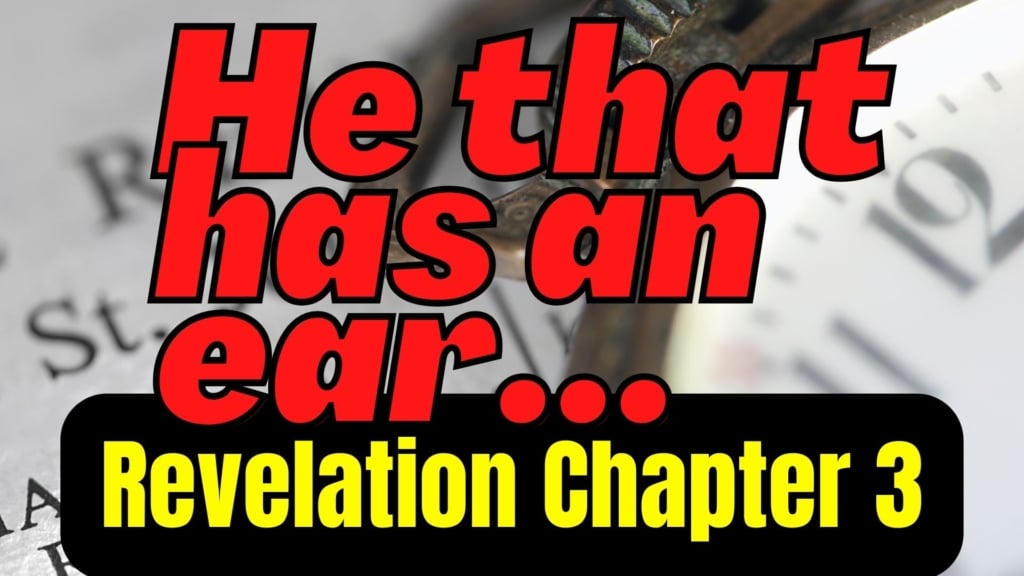
In this video, we finish the message to the last three of the seven churches.
Sardis—Revelation 3:1–6
The word “Sardis” means “remnant” or “those who escape.” This church has a name that it is “alive” but God says it is spiritually dead. The challenge is to “wake up” as in Ephesians 5:14. This wakening pictures a remnant of true believers, even in Sardis. This “awakening” returns to the Word of God that had been “received and heard.” Those who overcome are clothed in the white garments of imputed righteousness (Rom. 4:3–5; 2 Cor. 5:21). The book of life contains the names of those who trust in Christ alone (Rev. 20:12).
Historically, Sardis pictures the Reformation Church of 1500–1700 A.D. The awakening of men like John Huss, John Wycliffe, Martin Luther, and others brought a return to the Word of God as the only authority of faith and the truth of salvation by faith in Christ alone. Also, the individual priesthood of every believer (1 Pet. 2:5–9) delivered them from the tyranny of the Roman priesthood.
Note:
- An active church from the program’s standpoint, but dead through lack of doctrinal instruction and spirituality.
- Warned to remember what they received and heard (i.e., John’s teaching).
- There were, however, a few faithful in Sardis.
Philadelphia—Revelation 3:7–13
“Philadelphia” means “brotherly love.” This church reflected the biblical teaching of John 13:34–35. The Christ who holds the “keys” of history sets before this church an “open door” of service (cf., 1 Cor. 16:9; Col. 4:3). This missionary-minded church would have victory over the “synagogue of Satan,” and because of faithful perseverance would be kept from the “hour [time] of trial.” The overcomer is promised a permanent place of service in God’s eternal temple—bearing the name of God.
Historically, Philadelphia represents church history of 1700–1900 A.D. During this time, we have the great mission outreach of the Wesleys, Taylors, and Careys, among others. China, India, and Africa became centers of great evangelistic work. This missionary zeal will continue until the Rapture removes the true Church from Tribulation.
This is verified in 1 Thessalonians 1:9–10; 4:13–18; 5:9, as well as Rev. 1:19 and Rev. 4:1. In addition, the word “church” is mentioned all the way up to Rev. 4:1 (a picture of the Rapture), and from here, Israel becomes the focus. The reason for this is that the Tribulation is the “time of Jacob’s trouble” (Jer. 30:7) to refine and regenerate the nation of Israel.
Note:
- The missionary church—having the “open door” of evangelism.
- The key regarding Philadelphia is the recurrence of the words “kept My word” in Rev. 3:8–11.
- They were small, yet mighty through doctrine.
Laodicea—Revelation 3:14–22
Here, we have the final of the seven churches. The name comes from laos (“the people”) and kike (“rights”)—thus the “human-rights” church. The apostasy of this church is found in that it was “lukewarm.” The cooling of love for Christ begun in Ephesus has now become total apostasy and indifference. This church prided itself on its wealth, riches, programs, and buildings; but Christ was completely left out (Rev. 3:20). Jesus Christ vomits this apostate organization from His mouth (Rev. 3:16). Yet still the offer of grace was extended to anyone who will receive it (Rev. 3:18, 20. Interestingly, Laodicea was home of an eye salve of the ancient world. As the “Amen,” the faithful witness, Christ is the source of light from the Word. He promises those who would come out of this apostasy, fellowship (breaking the bread of life together) and ultimate exaltation in His throne (Rev. 3:20–22).
Historically, Laodicea represents the “modernistic” church. Whatever the name or designation, it places a premium on riches, programs, buildings and, above all, “human rights.” The social church has become man-centered and has pushed Christ out of His rightful place “in the midst of the churches.” In this age of complacency, Christ continues to call His people out from apostasy and into the true riches of His grace and fellowship.
Note:
- Lukewarm: apathetic to Christ, His Word, and the plan of God.
- A very large, wealthy local church. They had buildings, finances and crowds but divine viewpoint calls them “naked, wretched, miserable, poor and blind” (Rev. 3:17).
- They are believers (Rev. 3:19) but apathetic. The solution is positive volition to fellowship with Christ around His Word.
May we all, by His grace, return to the purity of faith in Smyrna, a fragrant aroma to God. May we regain that “lost love” for Him and reach out with the missionary zeal of Philadelphia. The door is still open!

